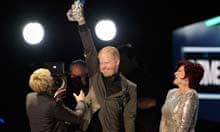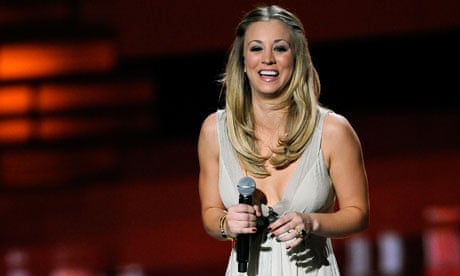A mere two states into the race for the Republican presidential nominations, political strategists are already living in fear of a dearth of enthusiasm among potential voters. The American economy is flagging, the country's collective morale is low, and Congress has about as much ability to affect institutional change as a middle manager who telecommutes. But there's a larger threat to voter enthusiasm, and it aired last night on CBS. I'm referring to the People's Choice awards, which for the past 38 years has been mocking and sullying the very concept of democracy itself.
When you stop to think about it, the very idea of the People's Choice awards is pretty repulsive. On its surface it seems reasonable enough. There's a chasm between what the critics and cognoscenti enjoy and the stuff people actually watch, read and listen to. There are plenty of awards handed out by smug little groups of hoity-toity connoisseurs, so why not an award selected by the people, and reflective of the kind of art hard-working Americans actually pay for? Here's the rub: artists are often forced to choose between daring, challenging work that most people will never understand, or broadly appealing work that will make them wealthy and famous. When actors and actresses make the latter choice, they have to use their money to buy their own ego ornaments, because the awards don't come easy. Enter the People's Choice awards, which essentially exist so that actors who star in popular-but-terrible things can have tangible objects to validate their work. That is, in addition to the houses, cars, and crystal bidets they bought with the money they made from the same people ostensibly voting to give them the award.
It might not be so bad, though, if there was something genuinely meritocratic about the process. If in order to be nominated for favorite TV comedy actress, for example, an actress would have to star in one of the five highest-rated comedies on television. But there appears to be no rhyme or reason to who gets nominated (aside from a clear tendency towards tabloid fixtures), and the show's producers have never revealed the details of their nomination process. Names show up on an online ballot, people apparently vote using those ballots, and people are awarded. Maybe I'm too old to have gotten the email, but I didn't vote for my favorite star under 25 or any other category because I had no idea this was a thing that was happening. I've never heard anyone talk about having voted, or seen any advertisements about voting, or heard it mentioned anywhere ever. Even the stars who show up to collect the awards seem just as baffled. "For all of you who voted for me and went out to the polls that day, or however it works, I don't know how you do it … thank you very much," said Ellen DeGeneres while picking up her favourite daytime television host award.

I'm not sure how possible it would be to produce an engaging, entertaining two-hour awards show with this particular award as its main component. Presenters trot out, announce the nominees, and then hand the awards to bemused winners who ramble a lot, not out of nerves but out of a complete absence of things to say about an award they have no emotional connection with. That's the bulk of the show. There's not even much opportunity to play celebrity audience spotting, since no one shows up to the People's Choice awards unless they know they're going to win one, and sometimes not even then (ahem, Lady Gaga). The host, Kaley Cuoco of The Big Bang Theory, did her level best to keep the affair as lively as possible, though, and the two musical performances from Demi Lovato and Faith Hill seemed random and arbitrary but were a welcome respite from back-to-back "This is such an honor, um … cause it's from the people!" acceptance speeches. (All of the acceptance speeches were nearly identical in tone, save for Adam Sandler, who did an uncomfortably lengthy and not terribly funny bit about thanking his old teachers when he collected his award for best comedy movie actor.)
In the age of Twitter, there's no bigger sin for an awards show than to be absent of OMG moments, and those are nearly impossible to create when there are two low-key performances and the winners know they've won before they already take the stage, and barely care anyway. So how do the People's Choice awards justify their existence? Apparently by having everyone continue to repeat the mantra: "This is the award chosen by the people!" Well if the people want Maroon 5 (favorite band) and Water for Elephants (favorite drama movie), perhaps it's time people gave some thought to people taking a break from deciding things for a while.

Comments (…)
Sign in or create your Guardian account to join the discussion